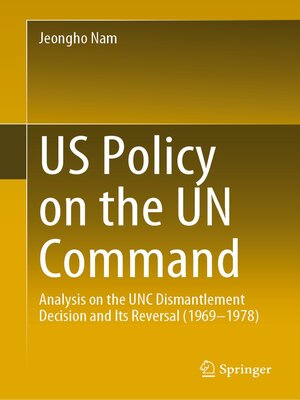US Policy on the UN Command
ebook ∣ Analysis on the UNC Dismantlement Decision and Its Reversal (1969-1978)
By Jeongho Nam

Sign up to save your library
With an OverDrive account, you can save your favorite libraries for at-a-glance information about availability. Find out more about OverDrive accounts.
Find this title in Libby, the library reading app by OverDrive.



Search for a digital library with this title
Title found at these libraries:
| Loading... |
This book investigates the history and role of the United Nations Command (UNC), which is important not only for the Korean Peninsula but also for East Asian security. The UNC has played a crucial role in maintaining peace on the Korean Peninsula divided by South and North Korea for the past 70 years. However, little is known about how the U.S. administration has perceived the role of the UNC and what policies it has implemented. It is known that the Nixon, Ford, and Carter administrations tried to dismantle the UNC in the 1970s, but eventually decided to reduce it rather than eliminate it. In this context, this study greatly helps us understand the true importance of the UNC by finding out the decisive reason why the U.S. did not remove it. According to the study, past official documents confirmed that the U.S. has recognized the UNC as the basis for maintaining the regime of the armistice on the Korean Peninsula. Historically, no studies have tracked U.S. policy on the UNC through primary data.
Currently, the U.S. is implementing a policy to revitalize the UNC, which had been reduced, in order to stabilize the East Asian region. Some say that the U.S. is trying to establish a kind of regional security system centered on the UNC. In any case, the study is crucial to understanding the true role of the UNC, which has recently attracted immense attention. Therefore, this book would be intriguing for experts around the world who are interested in the security in the Korean Peninsula.





